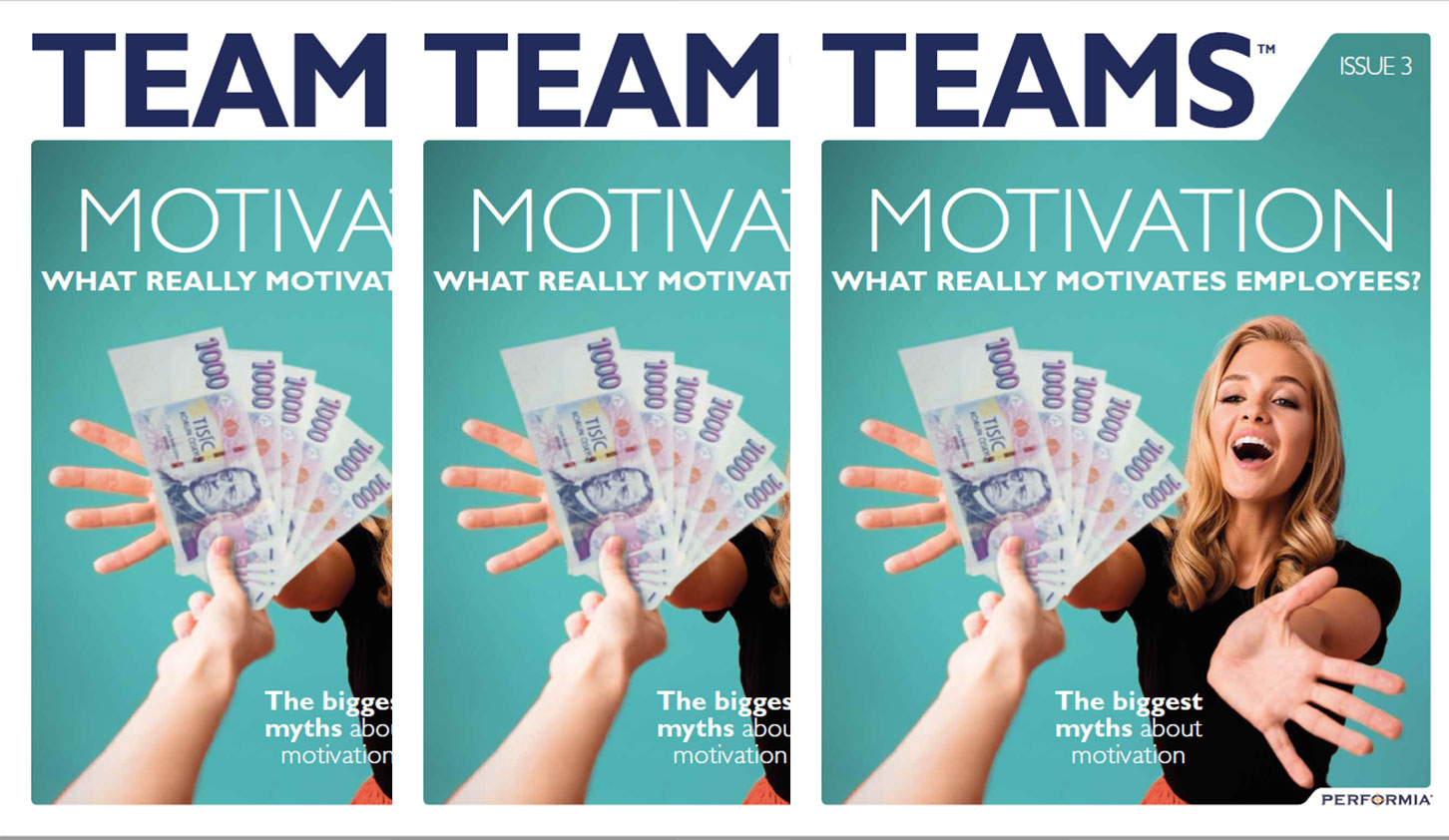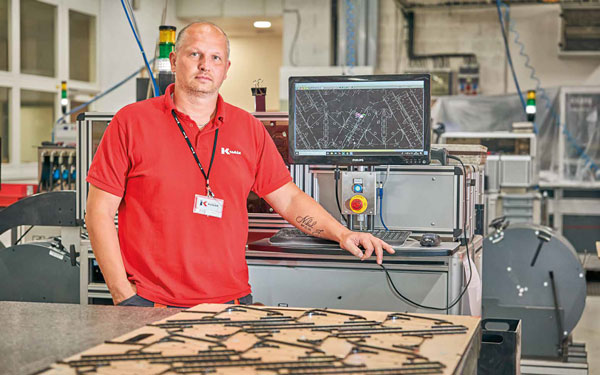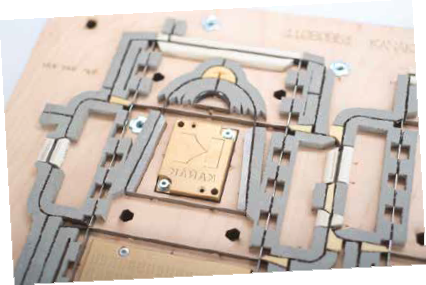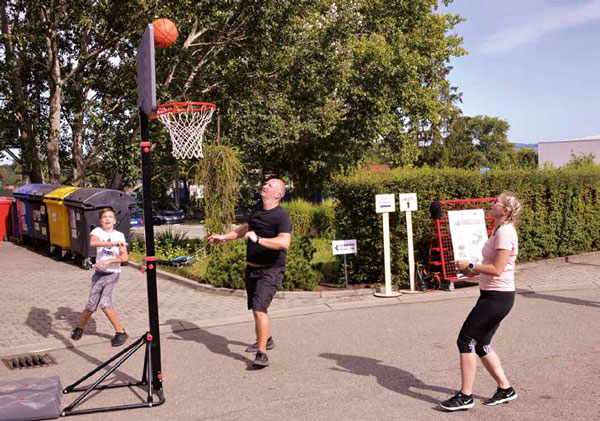
This issue is all about Motivation
MOTIVATION – the key to success
In this issue, we will cast some light on motivating employees. Motivation is both simple and complex. When it’s done correctly, it is very simple. When it’s done wrong, it can be problematic.
We have all experienced times in our lives when we were less motivated, when we were very tired of doing the same thing, when we dreaded every move. Working with no or very low levels of energy (motivation) is frustrating, and in this issue of Teams we will look more closely at the issue of motivation.
First of all, motivation comes from within the individual. When you are totally motivated there is almost nothing that will stop you from achieving your goals no matter how ambitious they are. In terms of production, we can easily see the difference between, for example, a highly motivated salesperson who loves interacting with clients and getting products compared to one who finds talking to people quite uninteresting. As a sales manager, this situation becomes, to quite some degree, your problem.
As part of this issue, we interviewed a very skilled production manager, Mr. Peter Ringer from the Czech Republic, who shares his extensive experience and success in motivating staff.
For an even more fun and productive future,
Mårten Runow
CEO Performia International
“You have probably heard and read a lot about motivation. And where a lot is written about a subject there are often many myths as well.
Let’s have a look at the most common myths about motivation and how they might influence your attitude to motivating your staff or yourself.”
WHAT IS MOTIVATION?
The word motivation has its origin in the word MOTIVE, which means ‘the reason someone does something or wants something’. Motivation is an ‘inner setting’. Money and personal benefits belong to the lowest level of motivation, but we shouldn’t condemn or ignore these. We would not expect an employee to refuse payment for work done, or benefits. The problem arises when this is the ONLY motivation. At such a low level of motivation, we know that the degree of loyalty to the company and the willingness to work is also low.
On the other hand, people whose levels of motivation are not limited to money and benefits, but include enjoying what they do, and finding meaning and fulfilment in their work, are more loyal and more cooperative overall. When the employees are wholly committed to their job, they are highly motivated. You can find more information about different levels of motivation under the section “Trends (not only) in HR”. Now let’s look more closely at the biggest myths around motivation.
1. “The lower the position, the lower the motivation.”
This implies that every employee in a junior position works only for money/benefits, the lowest form of motivation. That also implies that there is no difference between candidates, so when it comes to motivation it does not matter who you hire. But this is not true. A person whose income is deficient cannot afford the luxury of not being motivated by money.
However, this does not apply to everyone, and I would like to sweep this myth off the table. Although employees in lower positions might not have their dream jobs, they usually have a choice, and you can tell which ones are more motivated. They are proud of their employer, they appreciate management, and they won’t allow one bad word said about the services or the goods they produce. Such employees demonstrate high levels of motivation through their interest and loyalty, which is commonly lacking in people who are motivated only by money/benefits.
OUR TIP
Did you believe this myth? No matter – here is a tip. Work on your company’s internal PR and communication and be interested in staff motivation, without prejudice. Direct your communication at those who are highly motivated, as this will raise the motivation of others.
2. “If I want my salespeople to bring in income, naturally they need to be money-motivated.”
Let’s look at this statement from a different point of view. You have probably seen many successful salespeople in your life. Not only because you bought something from them, but because they helped you and, in so doing, they added value to you and you bought from them again.
Having someone excited about your product or service is not incompatible with the desire to get paid well. And if you have a smart and fair rewards system you have an ideal scene. In this case your salespeople are more highly motivated not just by money, but by how much they can actually help their clients. And good money for the salesman is more or less automatic.
OUR TIP
Here is our next tip: Customers have many options and choices – they can choose from whom they wish to purchase goods/services. So, even though you might have very effective marketing strategies, the impression that your salesman makes on customers is vitally important. And that is why salespeople must be motivated by more than benefits or rewards.
3. “It is the manager’s job to motivate employees”
This is another giant myth. Tools for motivation, bonus systems, team-building sessions, and loyalty rewards, are all efforts to replace internal motivation with external motivation.
At first glance, external motivation works. But the success is short-lived, and soon new and more interesting strategies have to be found. In the end, all these strategies will not change the lack of internal motivation, which will remain insufficient or non-existent.
It is therefore quite evident that the solution is not the ability of managers to use motivational tools, but rather their ability to hire employees with existing internal motivation and then to support them (but not solely) with external motivational tools.
OUR TIP
Do you want a more motivated team? Spend less time and energy on embellishing your motivational strategies, and instead invest in identifying and recruiting candidates who are internally motivated. That is the optimum game that all parties would like to play – managers, employees, and ultimately also your customers.
4. “External motivation is, to some degree, manipulation”
This is probably true, as all of us know from school. As soon as I, as a student, have as the only reason for learning something like: “good grades, because only then will my parents and my teacher leave me alone and not penalize me for my performance score,” then this is more or less manipulation. How much would a student enjoy an A grade? How much would such a student desire to know something more about the subject? Yes, this is more manipulative than motivational.
A student who is interested and knows why he wants to learn something is different, isn’t he? He is internally motivated. The fact that he succeeds is not due to grades or the praise he gets from others – which is also nice. For such a student, or let’s say an employee, grades and praise are not the main reasons why he studies or does something. He does it because he is interested in his subject or his job and enjoys being productive.
And who doesn’t want more such employees, and even students?
OUR TIP
Our tip to demolish this myth is: Be interested in and support natural (internal) motivation in your employees. This is so much more powerful than attempting to manipulate them.
Imagine a boss who has 24 years of experience as a production manager. Who understands all the processes in the company. Who also has no problem going to work with his staff on Saturdays. A boss who thinks it is very important that all employees should have opportunities to grow as individuals and who, at the same time, is admirably soft-spoken. No, this is not a description of a character from a children’s fairy tale. I am talking about Petr Ringer, a real-life production manager from the Karel Kaňák, s.r.o. company. We interviewed Petr and here are his views on motivation.
For the benefit of those who don’t know the “Karel Kaňák” company, could you please briefly describe it.
We manufacture cutting tools that assist our clients in producing various types of containers – such as boxes for medicines, cosmetics or food, or for transportation of goods.
How many employees does your company have in total?

You don’t know what exactly is a cutting tool? You can imagine it like this.
Around 85.
And how many are there in your team?
At the moment, I have 40 people in my team.
You started at the company in 1996 and began by working in the production department as a machine technician. How did you work your way up to become the production manager?
The former director made me a foreman of a work shift team. After approximately a year, Mr. Kaňák asked me if I would be willing to lead the whole production department. My answer was: “Well, I can try it out, boss. If I fail, I will go back to the trenches”.
How did you fare as the new team leader in the production department? What were the biggest challenges?
My viewpoint was that the work simply had to get done – regardless of any considerations. I soon found out that not everyone had the same viewpoint. At the time, I really had little information on how to manage people. There were times when I got annoyed and had altercations with the staff. I just could not understand that certain people were not willing to do what was needed.
Since I came from the group of people I was leading, I could easily spot when staff tried to ignore work that needed to be done. However, when I pointed this out there was a strong reaction – almost mutiny.
We worried about the staff that we thought were
indispensable but when we looked back, we
realised that we were right not to compromise.
I suspect that the mutiny highlighted those that were not on board. Did you have to fire some staff?
Yes, I did. For example, we had to fire one of the employees because he would not change his attitude to his work. Even though originally, he was a fantastically hard-working person, he started refusing to do anything extra and was arrogant toward others. The moment he left, the mood of the department changed for the better. Immediately after he left, two young men in the production department had the opportunity to show what they could do, which they had not had before. After a couple of weeks, you didn’t notice that he was gone.
We had a few other cases like that. We worried about the staff that we thought were indispensable but when we looked back, we realised that we were right not to compromise. Those who thought they were irreplaceable are long gone and I can say that currently, we have a very healthy team.
How do you motivate your staff? What motivates them to remain in the company or in your team?

You don’t know what exactly is a cutting tool? You can imagine it like this.
That is a very difficult question. I try to work with each person individually. If I see that the person is capable of more and wants to grow, I provide the opportunities to do so. We have a few such people currently. For example, we have a colleague who started with glueing, and in a few weeks was learning how to operate CNC machines. On the other hand, some people have reached their peak and do a fantastic job and don’t want to grow more. In this case, it is about having a mutually friendly and respectful relationship. So, in motivating staff it’s very important to discover the inner person and to work accordingly.
Do you always provide opportunities for your staff to develop further? Does your company have the capacity to do that?
We try to develop staff as much as we can. Veterans, like me, have worked with all the different machines, so we know them well. But those who are new work only with one specific machine and have limited knowledge. One way to help them develop is to let them learn how to operate other machines – that way they will eventually be able to back each other up during holiday periods or sick leave.
The workflow is not always constant in the production department. Sometimes you have less work, and sometimes you have more work. Sometimes in order to meet the deadline we have to work overtime or weekends. How does the production manager deal with such situations?
It is always important to ask people. I seldom have to issue an order. The staff in our company are very willing to work. Often, they will see that something needs to be completed and they will initiate even working on a Sunday.
Now and then, when I hear my staff saying that they have to work on Saturday, I tell them:
“You know what guys? I will come with you.”
And they say: “You are kidding! You, the manager, will come to work with us?”
And I go work with them, and I can completely
clear my head while doing so.
What motivates you? Do you have some secret source of motivation?

Corporate sports day or events with families are already a tradition at Kaňák.
I simply enjoy the work. When you enjoy doing something and you have a lot of good people around you, this in itself is motivating. I really enjoy working with people. Now and then, when I hear my staff saying that they have to work on Saturday, I tell them: “You know what guys? I will come with you.” And they say: “You are kidding! You, the manager, will come to work with us?”
And I go work with them, and I can completely clear my head while doing so. I don’t have to handle people, manage, or give orders – I can simply bang with the hammer for eight hours.
Do you use Performia questionnaires in recruiting staff?
Yes, usually when hiring new people. My colleague, in the HR department, sends me all the applications and results and, based on this, we do the selection. Additionally, we always have the candidate try out the job for a week or two, in person. And, most importantly, the team then decides whether they want the person there.
With all this in place, there is no problem in motivating the team to work over the weekend.
If you could give one piece of advice for managers of Czech companies, on how to gain a well-motivated and working team, what would that be?
Appreciate your employees and thank them for their work. ■
PETR RINGER
 ■ Petr Ringer had studied to become a mechanic but when he started his first job, he felt he was back in Grade 1 again. He started working in Karel Kaňák, s.r.o. in 1996 as a machine technician in the production department. However, since the company was very small then, he wound up doing much more than that. He worked his way up from being a foreman of a work shift team to being the production manager. As a result, he knows all the production processes in his department. He cannot imagine doing anything else than working for Karel Kaňák, s.r.o.
■ Petr Ringer had studied to become a mechanic but when he started his first job, he felt he was back in Grade 1 again. He started working in Karel Kaňák, s.r.o. in 1996 as a machine technician in the production department. However, since the company was very small then, he wound up doing much more than that. He worked his way up from being a foreman of a work shift team to being the production manager. As a result, he knows all the production processes in his department. He cannot imagine doing anything else than working for Karel Kaňák, s.r.o.
He has a very successful marriage and family, and he considers this his biggest personal success. He relaxes from his day job when he goes to work on Saturdays – to help his staff in production. In his free time, he enjoys sports such as tennis and cycling.
Salary, bonuses, salary, bonuses. Or a little different: salary, bonus, benefits, salary, bonus, benefits… Does this not seem monotonous? Maybe this is the reason why many managers consider this type of motivation to be the less fun and creative part of their jobs. Are all people only motivated by money and bonuses? How about those who are enthusiastic and passionate about their jobs?
INFLOW
THE CHARACTERISTICS OF AN INFLOW-ORIENTED EMPLOYEE
An ‘inflow-oriented employee’ has most of his attention focused on what he can get or gain, and thus he is constantly estimating what the returns will be and whether he should waste his time and energy on a given job. There aren’t many things that make him enthusiastic about his work – except personal benefits or financial returns. He is in fact a ‘mercenary’ and not a team player.
Such an employee will recalculate his salary, demand refunds for every expense, and he will spend much of his work time demanding salary increases. This individual is likely to leave the company because he has to work extra hours or because the company decides to change its remuneration policy by linking salaries to actual production.
His attitude: First, you have to pay me and then I will figure out how much I will be willing to work.
OUTFLOW
THE CHARACTERISTICS OF AN OUTFLOW-ORIENTED EMPLOYEE
The attention of this person is focused primarily on his work and anything connected to it. It is not that he does not want to earn money, or benefits. No. But there are also other factors that motivate him. For example, he likes his job, and he finds it fulfilling. He supports the company’s purpose and vision. The organizational goals and targets make sense to him and he wants to be part of achieving them.
Since such a person really likes to work and it is natural for him to move things forward, this is where most of his attention is focused. You do not have to encourage him to work and contribute as he understands the basic principle of exchange – that he first needs to produce something and then he can expect something in return.
His attitude: When I produce enough valuable outflow, I will in return receive an inflow.
Use all tones
When you try to motivate employees who are inflow-oriented, playing the motivational keys on the imaginary keyboard will be very monotonous. You will often be forced to defend the way in which your company rewards staff, how the bonuses are calculated and how company cars are equipped. That would not be a lot of fun. And you will probably find out that the “repertoire” at this tone level is quite limited. In this case, playing a melodious tune is quite difficult. Both you and the employees will realise that the song is discordant.
On the other hand, when you motivate a person who is outflow-oriented, you will observe that it is a more natural and pleasant process. Just talking about his job, his successes and areas for improvement will have a positive effect on his motivation. The right fuel for such a person is creating, figuring things out and moving things forward as part of the team. Of course, provided that you pay him well for his production and customise his personal benefits, that is. For both parties this is then a “fantastic symphony”.
DUTY
Such an employee works because “it simply needs to be done”. He considers his job as something natural but also vital; he has no problem with assisting others where it is needed and does not focus on what he will be paid for doing so.
PERSONAL CONVICTION
In this case, the employee wants his job to have value, and although he wants to earn money, he is more concerned with creating positive effects through his job, and he is convinced that the job and its results are important.
PERSONAL GAIN
This employee works mainly for what he will get, but broader than just money. Examples: The workplace is close to his home and that is why he wants to work there. The workplace provides a car and meal vouchers.
MONEY
This employee works only for money and doesn’t care much about what he is doing. Such a person doesn’t care what your company does as long as you pay him enough. Loyalty is very low at this level.
▲ White keys represent ways in which to motivate employees on a Motivational Scale
Having a purpose in life is dependent on your personal motivation. Motivating yourself can often be harder than motivating others. A number of clients shared their insights and experiences with us on the topic of motivation.
- How would you define ‘motivation’?
- How do you motivate your team? And what do you think demotivates your staff the most?
- Have you ever felt demotivated? If so, describe what occurred.
- Do you have a special recipe for motivating yourself?
Mark Hutchison,
Owner of Lifewood, Australia
- Motivation is about your internal dialogue. The more in balance I am in my life, the more I’m able to overcome situations – we’ve got adversity coming at us all the time, and I think when we’re out of balance, controlling the negative dialogue in our head is difficult.
When I’m demotivated, it’s because I’m blaming someone else for my circumstances. So, if I can actually take 100% responsibility for my circumstances, I’m actually quite motivated.
My definition of motivation is the ability to constantly move forward. If you’re motivated, you seem to be moving forward towards something. At the times when I’ve been demotivated, it’s when I’ve lost sight of my goals. It’s when I’ve lost sight of the endgame, I’ve forgotten why I’m doing what I’m doing. And knowing why you do what you do, is the backbone of motivation. Motivation is quite often skin-deep for a lot of people. This is why I don’t go to motivational speakers. I am internally driven from a sense of purpose.
Motivation is knowing what you’re here to do, why you are doing it, who you are, and your actual worth – there has to be a sense of self-respect.
- I need to be the “positive energy guy” in the room. So, if my motivation is down, my team is down. One of the things that’s been a big game-changer in motivating my team is creating targeted games. Having individual targets in place. What motivates the team is knowing their product really well, knowing their targets within the game and knowing what their reward will be.
And what demotivates people the most? Shifting goalposts, shifting rules, not knowing the rules. Not knowing the game, not knowing how to win, being talked about behind their backs, feeling unsafe and not feeling like they’re trusted. All the negative things about culture, gossip, office politics, playing favourites. All that stuff is negative. - Yeah, absolutely. I spent five years on the edge of bankruptcy. In October 2018, I was half a million dollars in debt. And I had no results, no sales orders, and a company culture that was nothing short of toxic. I had had a fully operational business that was worth $5 million, but by 2019, it was in the negative to half a million dollars. I was broke, I had no personal assets.
Why? As a result of bad hires. We had got ourselves in a situation where we had a toxic culture, poor manufacturing quality and warranty issues.
I had a toxic general manager, I had warranty problems coming up, I also had a timber mill losing a million dollars a year that could not be resurrected, because the technical challenge was just too much.
And on top of that, I was a single parent with two small children, a five-year-old and a seven-year-old, of which the five-year-old had every conceivable allergy you could possibly imagine.
I think Performia Australia came in around that time and did some internal evaluations of my team.
We now had a very exciting opportunity in front of us. We changed the team around and solved the product supply issues. Our product was now on spec, on price and arriving at the right time and in the right quantity.
We exited our manufacturing from China and set up world-class, quality products by training manufacturers in Vietnam to make a highly technical product.
We’ve now got a culture that re-energizes the entire company. We started this year with a robust stock holding, robust team, robust cash flow, robust cash reserves, robust systems and a very exciting, strategic future. And we’ve got an international patent that has been revised and accepted. - I think the challenge of motivation lies in the mind. But there are external things you can do to assist in motivating yourself. For example, if you take care of your body by getting enough sleep and eating a well-balanced and nutritious diet, then you are less likely to become depressed and demotivated.
Michaela Pojezdna
Director of Deckard & Penfield s.r.o., Czech Republic
- To know and to believe that what I do has a purpose.
- Let’s start with the second question. You can easily demotivate an employee. It’s enough if you stop respecting the person, take the person for granted, or you just don’t talk to the person enough. Not knowing what is happening in the company and the inability to influence things can be very demotivating. But I have to say that I have a fantastic team that is very experienced and is a pleasure to work with. I am in contact with my team daily. We update each other on our work every day, and I create opportunities for joint decision-making. It is very important for every member of the team to know what is expected of them, and for them to understand their respective roles in the company and what value they add. Personal acknowledgement, even though it sounds clichéd, is still the biggest motivator for healthy team spirit.
- Yes, definitely, and not only once. I really like things to be done exactly as I imagine they should be done. However, the reality is sometimes different. We are working with a range of staff, which brings many variables into the workplace, and that can sometimes be demotivating to me personally…
- I wouldn’t say I have a recipe. I do things that I enjoy doing and not the things I dislike doing. And maybe I am lucky in that there are few things that I don’t enjoy doing, so there is no need to search for motivation. I am still enjoying doing recruitment.
Tibor Berszany
GM of BERTIS GROUP,
Romania, 1,200 employees
- The individual’s willingness to work, to perform, and to reach his/her objectives.
In my view, if a person is solely focused on surviving from one day to the next, such a person will be difficult to motivate to give an outstanding performance.
- Of course, financial motivation is important, especially in positions where pay is linked to performance. However, in my experience, professional and personal acknowledgements are more important, as well as the opportunity to develop, and to advance in one’s career. And what demotivates employees the most? If the employees do not feel accepted in the team or feel underappreciated by their boss, or the atmosphere in the workplace is unpleasant. Then it isn’t possible to perform even with financial motivation.
- As I mentioned before, motivation is completely personal and internal. Therefore the reason for losing your motivation is a personal matter, such as a family conflict, or a feeling of hopelessness. I have become demotivated on occasion when there was a family conflict – my motivation fluctuated for a few days, I felt there was no point in pushing myself …. but since I generally am a positive person, I soon overcame those ups and downs.
- You should always do what you are passionate about. Let your work be your hobby too!!
Set goals for yourself and enjoy the journey.
Have you ever wondered why people need a reason to do something? How do I, as a manager, keep my team together, motivated and productive in this era of flexible working hours and home offices? The founder and owner of Performia, Mårten Runow, has the answer. “There is nothing that brings me more fulfilment, pleasure and pride than when I find effective ways to assist others”, says Mårten Runow about his own motivation in building successful teams. He adds, “And what I like most is helping someone else become more able to help others. In that way, the person I helped becomes more valuable to his environment.” Making money to ensure your happiness might be tempting but it does not lead to happiness. Mårten Runow emphasizes that those who help others seldom have a problem making and having money. Have you ever experienced helping someone selflessly, and some time later you get a flow back? Whether in the form of money or gratitude or new friends.
WHY DO PEOPLE NEED GOALS?
“The bookstores are bursting with motivational books and the internet is full of quotes on motivation or workshops on how to discover your purpose,” says Mårten Runow. “The truth is that without having to fight for something there is no real happiness. Those who have no goals at all are usually miserable, and those who have set themselves high goals and targets are usually fulfilled and happy.” Why do people need goals and barriers in order to be happy? According to Mårten Runow, it’s simply because, without any barriers, life becomes tedious and boring. “When you have a goal or purpose that really inspires you, it is like your life is connected to a fully charged “battery” and you do not have the need to force yourself to work, as it happens automatically”.
When you have a goal or purpose that really inspires you, it is like your life is connected to a fully charged “batter y”.
The most recent change in the workplace is decentralized home offices. Many companies have allowed staff to work from home fully or partially; this has resulted in shared spaces on a relay basis in the office. If you are one of those people who has experienced working from home, you may ask yourself how and in what way this innovation will affect the motivation of staff and, in particular, teamwork? Has this strengthened or weakened the team?
 MOTIVATION IN THE “HOME OFFICE” ERA
MOTIVATION IN THE “HOME OFFICE” ERA
If you understand the dynamics of a successful team, it should be clear to you that most employees need to be motivated regularly in order to get the required results. How can managers motivate their teams when working from home has become the norm? Only time will tell how they will motivate people. According to Mårten Runow, “How productive a person is when working from home depends on the degree to which the individual is able to motivate and manage himself. Some people are easily able to do so while others find it extremely difficult. Thus, you as the manager must understand what it takes to maintain the high productivity of each member of the team when there is no one supervising them. That is why Performia provides advice to clients about staff motivation and how to avoid making costly mistakes.” According to Mårten Runow, home offices could work, but you need to ensure the following points are taken into consideration: To build a productive and tight team you need to maintain a high level of communication between the members, and ensure that you provide regular feedback and good coordination despite the physical distance that comes with using home offices. To maintain productivity levels, the team must be able to get together regularly to exchange ideas and make sure everyone is on board in solving potential problems and in achieving the company targets. Ideally, there should be a mix of live and online meetings. The most important factor, however, is that your team members are actively in contact with each other and focused on the purpose of the company, so they are well aware of why they do their job.
You as the manager must understand what it takes to maintain the high productivity of each member of the team when there is no one supervising them.
THE ERA OF FLEXIBILITY IS HERE
We have already touched on the era of home offices as well as new trends in long-distance work. This new generation of staff want to be in charge of their time, have flexible working hours and, in some cases, want to be “digital nomads”. According to Mårten Runow, companies must be prepared for this trend. However, they should not be too concerned, as long as they keep one condition in mind. You should not be surprised to know that it is a factor that we at Performia always stress: “In accommodating flexible and decentralised working conditions you will need to make sure that high productivity levels are maintained. That is the fundamental thing. Where we work and when we work must not be allowed to crash productivity.”
MOTIVATING STAFF – MOVING FORWARD
You might imagine that motivating staff in a modern workplace is somewhat different and that your internal PR and communications will have to be suitably adjusted. However, the basic principles remain the same. Mårten Runow advises that managers will need to look for new tools to help them maintain production levels. These tools must assist in getting things done, help to inform people and ensure that everyone knows what is going on in the company. “If the tools don’t make the above happen, then the staff motivation will suffer enormously.” If the staff has goals and targets, and managers have effective tools, companies will be able to build productive teams, whether the staff is working from home or in different time zones. However, one question remains. What does one do with a person who is productive, has great potential but isn’t motivated to do anything with it? To what extent can management solve this and to what extent does the solution lie with the individual? “The real question is if the ones who are really producing want to support those who have no willingness, no energy and no skills. History tells us that it does not work very well, and that is why we advise our clients to demand that their new staff should have demonstrated the willingness to work and get results BEFORE they get hired in your company.” Always be motivated in what you do, as we believe that makes motivating others so much easier. ■
